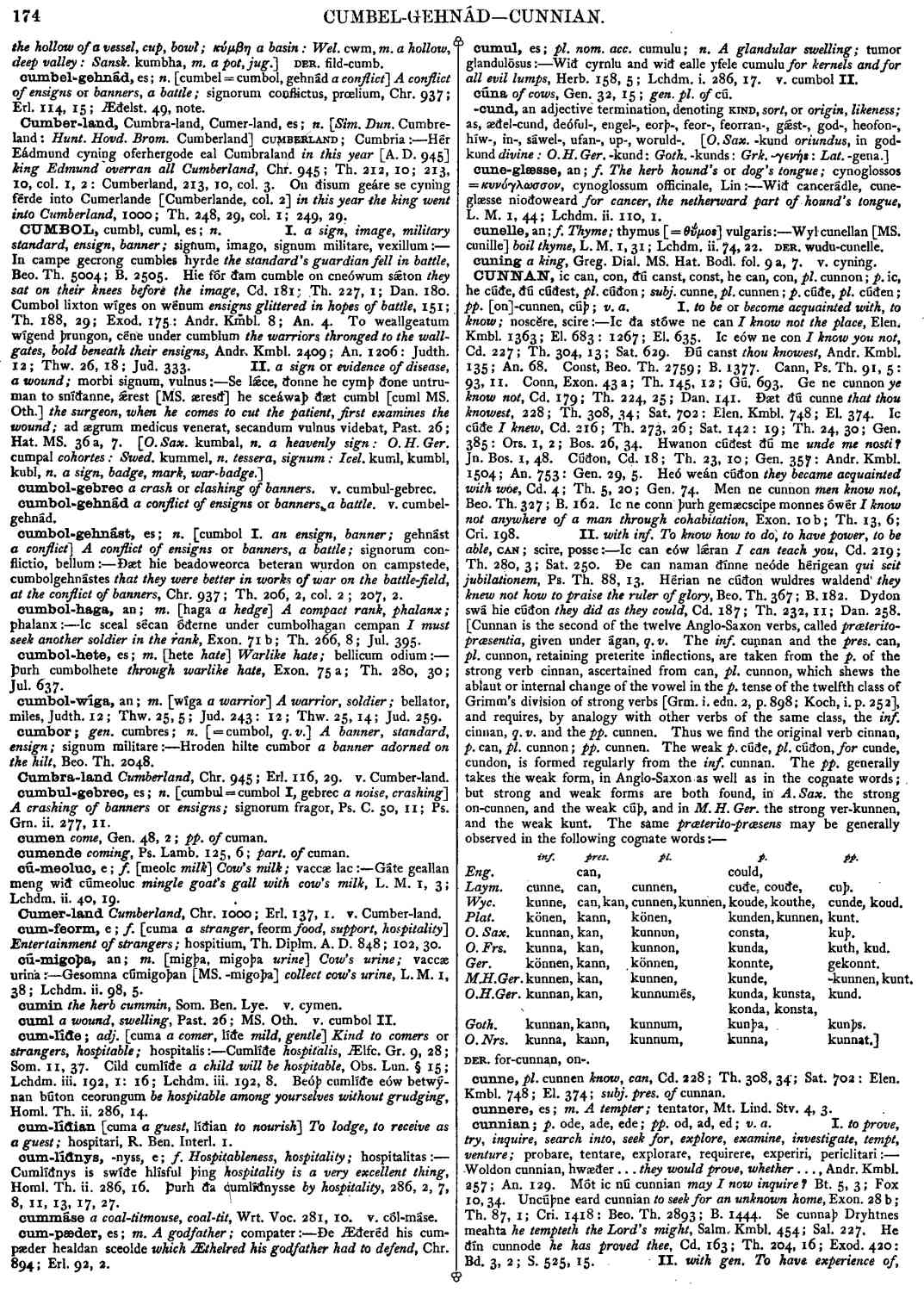CUNNAN
- verb [ preterite-present ]
-
Ic ða stówe ne can
I know not the place,
- Elen. Kmbl. 1363 ;
- El. 683: 1267 ;
- El. 635 .
-
Ic eów ne con
I know you not,
- Cd. 227 ;
- Th. 304, 13 ;
- Sat. 629 .
-
ÐÚ canst
thou knowest,
- Andr. Kmbl. 135 ;
- An. 68 .
-
Const,
- Beo. Th. 2759 ;
- B. 1377 .
-
Cann,
- Ps. Th. 91, 5: 93, 11.
-
Conn,
- Exon. 43a ;
- Th. 145, 12 ;
- Gú. 693 .
-
Ge ne cunnon
ye know not,
- Cd. 179 ;
- Th. 224, 25 ;
- Dan. 141 .
-
Ðæt ðú cunne
that thow knowest,
- 228 ;
- Th. 308, 34 ;
- Sae. 702: Elen. Kmbl. 748 ;
- El. 374 .
-
Ic cúðe
I knew,
- Cd. 216 ;
- Th. 273, 26 ;
- Sat. 142: 19 ;
- Th. 24, 30 ;
- Gen. 385: Ors. 1, 2 ;
- Bos. 26, 34 .
-
Hwanon cúðest ðú me
unde me nosti?
- Jn. Bos. 1, 48 .
-
Cúðon,
- Cd. 18; Th. 23, 10 ;
- Gen. 357: Andr. Kmbl. 1504 ;
- An. 753: Gen. 29, 5 .
-
Heó weán cúðon
they became acquainted with woe,
- Cd. 4 ;
- Th. 5, 20 ;
- Gen. 74 .
-
Men ne cunnon
men know not,
- Beo. Th. 327 ;
- B. 162 .
-
Ic ne conn þurh gemæcscipe monnes ówér
I know not anywhere of a man through cohabitation,
- Exon. 10b ;
- Th. 13, 6 ;
- Cri. 198 .
-
Ic can eów lǽran
I can teach you,
- Cd. 219 ;
- Th. 280, 3 ;
- Sat. 250 .
-
Ðe can naman ðínne neóde hérigean
qui scit jubilationem,
- Ps. Th. 88, 13 .
-
Hérian ne cúðon wuldres waldend
they knew not how to praise the ruler of glory,
- Beo. Th. 367 ;
- B. 182 .
-
Dydon swá hie cúðon
they did as they could
,- Cd. 187 ;
- Th. 232, 11;
- Dan. 258 .
- [Cunnan is the second of the twelve Anglo-Saxon verbs, called præterito*-*præsentia, given under ágan, q. v. The inf. cunnan and the pres. can, pl. cunnon, retaining preterite inflections, are taken from the p. of the strong verb cinnan, ascertained from can, pl. cunnon, which shews the ablaut or internal change of the vowel in the p. tense of the twelfth class of Grimm´s division of strong verbs and requires, by analogy with other verbs of the same class, the inf. cinnan, q. v. and the pp. cunnen. Thus we find the original verb cinnan, p. can, pl. cunnon; pp. cunnen. The weak p. cúðe, pl. cúðon, for cunde, cundon, is formed regularly from the inf. cunnan. The pp. generally takes the weak form, in Anglo-Saxon as well as in the cognate words; but strong and weak forms are both found, in A. Sax. the strong on-cunnen, and the weak cúþ, and in M. H. Ger. the strong ver-kunnen, and the weak kunt. The same præterito-præsens may be generally observed in the following cognate words :--
- amp;nbsp; inf. pres. pl. p. pp. Eng. can, could, Laym. cunne, can, cunnen, cuðe, conðe, cup. Wyc. kunne, can, kan, cunnen, kunnen, konde, kouthe, cunde, koud. Plat. könen, kann, könen, kunden, kunnen, kunt. O. Sax. kunnan, kan, kunnun, costa, kuþ. O. Frs. kunna, kan, kunnon, kunda, kuth, kud. Ger. können, kann, können, konnte, gokonnt. M. H. Ger. kunnen, kan, kunnen, kunde, -kunnen, kunt. O. H. Ger. kunnan, kan, kunnumés, kunda, kunsta, kund. konda, konsta, Goth. kunnan, kann, kunnum, kunþa, kunþs. O. Nrs. kunna, kann, kunnum, kunna, kunnTat.]
Bosworth, Joseph. “CUNNAN.” In An Anglo-Saxon Dictionary Online, edited by Thomas Northcote Toller, Christ Sean, and Ondřej Tichy. Prague: Faculty of Arts, Charles University, 2014. https://bosworthtoller.com/6839.
Checked: 1